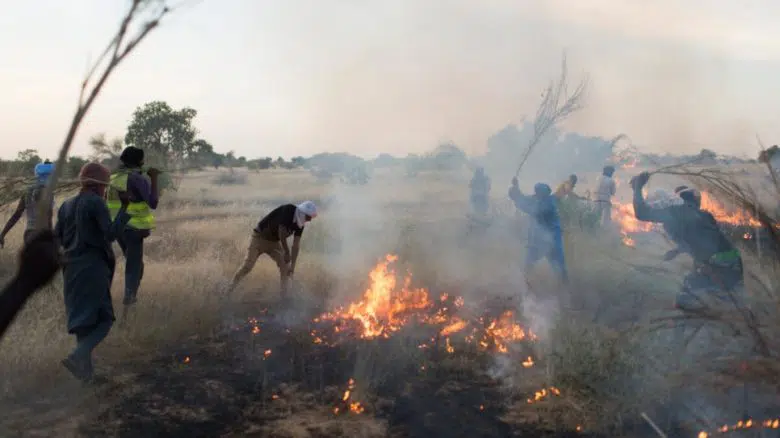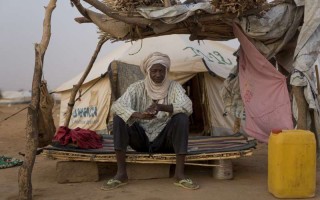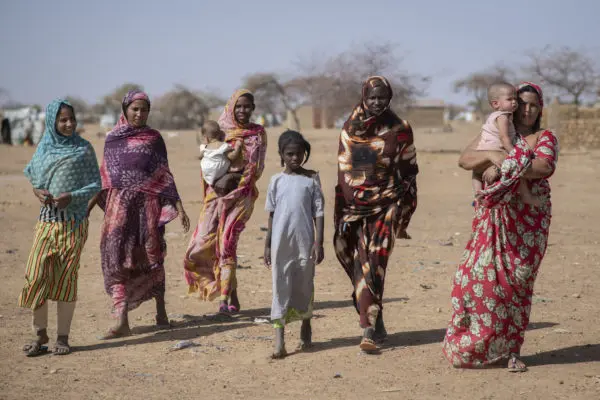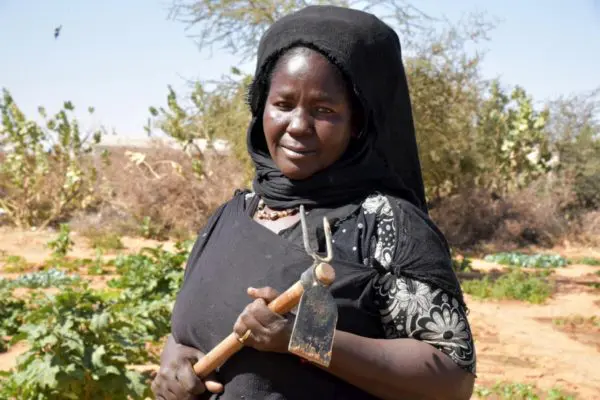
Members of the Refugee Fire Brigade use branches to beat out a large bushfire near the Mauritanian border with Mali.
© UNHCR/Colin Delfosse
Malian refugees and local Mauritanians are fighting wildfires as part of wider efforts to stem the impacts of climate change on an increasingly fragile environment.
By Catherine Wachiaya in Mbera refugee camp, Mauritania
A convoy of pickup trucks hurtles through a field of tall grass and shrubs, towards a plume of smoke on the horizon. Seated in the backs of the trucks are men of all ages, their eyes fixed on the smoke.
As the vehicles approach the source of the smoke – a huge bushfire – the men jump out of the trucks. Armed with no more than tree branches, they attack the fire, yelling inaudibly and moving in unison. Within minutes, the fire is extinguished, leaving behind a charred area about two kilometres long and three kilometres wide.
At the centre of the action is 52-year-old Ahmedou El-Bokhary, a Malian refugee and the leader of this voluntary fire brigade.
“This is the third fire we have put out in 24 hours,” he says as he wipes sweat from his eyes.
His comrades gather around as he picks up his phone and speaks rapidly into it. He yells out instructions – there is another fire about five kilometres away. The men jump back into the trucks and speed off in the opposite direction.
This is a typical day for Ahmedou and his fellow firefighters, about 100 Malian refugees and Mauritanians. The brigade puts out fires in the area surrounding Mbera refugee camp in south-eastern Mauritania’s Hodh Chargui region.
Mauritania is already feeling the impacts of climate change. About 90 per cent of its territory is desert, making it especially vulnerable to the effects of deforestation and drought.
As the climate here has become hotter, the frequency of wildfires has increased at an alarming rate, posing a serious threat to the dwindling grass and tree cover. This dry season, (from September 2020 to July this year), there were over 35 bushfires, up from 15 in the previous dry season.
“We have never seen a year like this. This is the year with the most bushfires,” says Ahmedou, who has lived here since 2012.
About 68,000 Malians live in and around Mbera camp, located some 60 kilometres from the border with Mali. Most of the refugees, like their Mauritanian hosts, are pastoralists and keep large herds of livestock. Their heavy reliance on the environment to provide pasture for their animals and their desire to help protect the local communities that are hosting them was the reason why they started the fire brigade.
“If we don’t put out the bushfires, we’re doomed.”
During the dry season, from September to July, the long green grass that grew during the rainy season dries and become straw like, making it easily ignitable.
“There is a lot of dry grass now and when one part catches fire, the entire area goes up in flames quickly,” explains Ahmedou. “We intervene because we have no choice. If we don’t put out the bushfires, we’re doomed.”
So dedicated are the firefighters that UNHCR, the UN Refugee Agency, and the local authorities support them with transport and airtime for their mobile phones to communicate with the network of people in the area who alert them when there is a fire.
“Whenever there is a fire, we call on the Refugee Fire Brigade. We all work together to put it out,” says Mohamed Cheikh Macire, the prefect of the department of Bassikounou.
He adds that the fires are a cause of great concern for both refugees and Mauritanians. By working together to put them out, the whole community is battling a common enemy and improving relations in the process.
Benjamin Kambale, UNHCR’s Associate Field Officer based in Bassikounou, notes that the fire brigade has become a symbol of environmental activism, spurring the refugees, their host communities and partner agencies to do more.
He explains that one key method that the communities have adopted to prevent bushfires is the creation of ‘firewalls’ – stretches of land that are cleared of dried plant debris and other vegetation that could fuel bushfires.
“Last year, 100 kilometres of firewalls were built,” he explains, adding that these efforts are contributing towards the Great Green Wall – a massive reforestation project that aims to grow an 8,000-kilometre-long barrier to combat environmental degradation in the Sahel.
SOS Desert, a local partner organization of UNHCR, has established tree nurseries throughout the camp, where thousands of saplings are tended by refugees and Mauritanians. As of September, this year, over 58,000 trees had been planted as part of reforestation efforts in the region.
In addition, nearly 10 hectares of land has been set aside in and around the camp for refugees and locals to grow vegetables such as tomatoes, peppers, hibiscus, beans and onions. Not only are the vegetable gardens helping to preserve the environment by increasing green cover and reducing soil degradation, they are also improving the diets of refugees and Mauritanians.
Refugee-led organizations such as VRPC (Volontaires Réfugiés pour la Propreté du Camp) also conduct regular community awareness campaigns to educate camp residents on how to preserve the environment, the benefits of planting trees, reducing firewood usage and using renewable energy sources such as solar energy.
“Everyone is doing their bit to address the climate challenge,” says UNHCR’s Kambale, adding that a vocational training centre has been opened in the camp, where refugees and Mauritanians can take courses in electrical and mechanical engineering and learn how to install and maintain solar panels.
Subscribe to UNHCR’s mailing list
As UNHCR – which plans to donate a fire truck to the district of Bassikounou in 2022 – continues to work with other partners and local authorities to expand environmental interventions in the region, Ahmadou and his brave firefighters remain committed to their cause – saving the pasturelands that are a lifeline for their way of life.
“Nobody forces us to do this work. We do it of our own free will because for us, someone who protects animals, protects their loved ones, and at the same time creates good relations between refugees and locals,” he says. “We are proud of that.”
Originally published by UNHCR on 30 November 2021.





